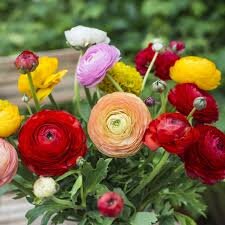Ranunculus, commonly known as buttercup, is a popular flower in the gardening world due to its vibrant colors and delicate, layered petals. Whether you’re looking to enhance your garden or use them in floral arrangements, these flowers offer both beauty and versatility. This article will explore everything you need to know about ranunculus, from planting and care to their symbolism and uses.
What is Ranunculus?
Ranunculus is a genus of over 600 species of flowering plants in the family Ranunculaceae. Native to various parts of the world, including Europe, Asia, and North America, they are widely cultivated for their bright, showy blooms. They are perennial plants, meaning they can bloom year after year under the right conditions.
Varieties of Ranunculus
There are several varieties of ranunculus, each with unique characteristics. Here are some of the most popular types:
Persian Buttercup
The Persian Buttercup is the most common type of ranunculus, known for its large, vibrant flowers. They are often found in a wide range of colors, from bright reds, yellows, and oranges to soft pastels like pink and white.
Creeping Buttercup
This variety is more suited for wildflower gardens and natural landscapes. It has a creeping growth habit and produces smaller, yellow flowers. While beautiful, the creeping buttercup can be invasive in some areas.
Water Buttercup
As the name suggests, this type of ranunculus thrives in wet environments, such as ponds or marshy areas. It produces delicate, white flowers and is often used in water gardens.
Alpine Buttercup
Native to mountainous regions, the alpine buttercup is a hardy variety that can withstand colder climates. Its bright yellow flowers stand out in rocky, high-altitude landscapes.
Planting Ranunculus
Ranunculus are relatively easy to grow, making them a favorite among both novice and experienced gardeners. Here’s a step-by-step guide to planting ranunculus in your garden.
Choosing the Right Location
Ranunculus thrives in full sunlight, so it’s important to choose a location in your garden that gets at least 6 hours of direct sunlight daily. They also prefer well-drained soil, as overly wet conditions can lead to root rot.
Preparing the Soil
Before planting, it’s essential to prepare the soil. Ranunculus prefers slightly acidic to neutral soil with a pH range of 6.0 to 7.0. You can amend your garden soil with compost or well-rotted manure to improve drainage and add nutrients.
Planting Bulbs
Ranunculus grows from tuberous roots, which resemble small claws.To plant, dig holes about 2 inches deep and space the tubers about 6 inches apart. Place the tuber with the “claws” facing downward and cover with soil.
Watering
After planting, water the tubers thoroughly. Ranunculus requires consistent moisture during its growing season, but be careful not to overwater, as this can cause the tubers to rot.
Fertilizing
For healthy blooms, fertilize your ranunculus plants with a balanced, slow-release fertilizer every 4-6 weeks during the growing season. This will provide the necessary nutrients for strong growth and vibrant flowers.
Caring for Ranunculus
Ranunculus is relatively low-maintenance, but a little extra care can go a long way in ensuring that your plants thrive.
Deadheading
To encourage continuous blooming, it’s important to deadhead (remove) spent flowers. This redirects the plant’s energy towards producing new blooms rather than setting seeds.
Pests and Diseases
Ranunculus are generally hardy plants, but they can occasionally fall prey to pests like aphids, slugs, and snails. These can be managed with organic pest control methods or insecticidal soaps. Diseases such as powdery mildew and root rot can occur in overly wet conditions, so proper drainage is key to preventing these issues.
Overwintering
In colder climates, ranunculus tubers need to be dug up and stored indoors over winter. After the foliage dies back, carefully lift the tubers out of the ground, brush off any soil, and let them dry. Store them in a cool, dry place until the following planting season.
Symbolism and Meaning of Ranunculus
Ranunculus flowers are rich in symbolism and are often used to convey a variety of emotions and messages. Their layered petals and vibrant colors have made them popular in both art and culture.
Symbol of Radiant Charm
One of the most common meanings associated with ranunculus is radiant charm. The delicate, multi-petaled blooms symbolize attractiveness and charm, making them a popular choice for romantic occasions like weddings and anniversaries.
A Sign of Gratitude
Ranunculus can also be given as a token of gratitude. Their bright, cheerful appearance makes them a perfect gift to express appreciation and thankfulness.
Associated with Energy and Positivity
In some cultures, ranunculus is seen as a symbol of positive energy and joy. Their colorful petals bring a sense of happiness and vibrancy, making them an ideal flower for celebrations and happy occasions.
Uses of Ranunculus
Ranunculus is not only beautiful but also versatile. They are used in a variety of ways, from garden decoration to professional floral arrangements.
Garden Landscaping
Ranunculus is a great addition to any garden. Whether planted in flower beds, borders, or containers, their bright colors and long blooming period make them a favorite for gardeners looking to add color to their landscape.
Cut Flowers
Ranunculus flowers are highly prized for their long vase life and are often used in bouquets and floral arrangements. Their delicate, rose-like appearance makes them a popular choice for wedding bouquets, centerpieces, and other formal events.

Dried Flowers
Ranunculus can also be dried and used in various crafts and decorations. When properly dried, the flowers retain their color and can be used in wreaths, potpourri, and other decorative items.
Conclusion
Ranunculus is a stunning and versatile flower that can add beauty to any garden or floral arrangement. With its wide range of colors and easy-growing nature, it’s no wonder that ranunculus has become a favorite among gardeners and florists alike. Whether you’re planting them in your garden, using them in a bouquet, or simply admiring their beauty, ranunculus is sure to bring joy and charm to your life.



